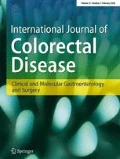Abstract
Background
This study aimed to investigate the prognostic factors of patients with stage IIA (T3N0M0) colon cancer in terms of macroscopic serosal invasion and small tumor size.
Methods
We enrolled 375 stage IIA colon cancer patients who underwent curative resection between January 2004 and December 2011. Macroscopic serosal invasion was defined as tumor nodules or colloid changes protruding the surface of the serosa. The clinicopathologic characteristics were analyzed to identify independent prognostic factors.
Results
The median follow-up was 47 months (range, 1–90 months). On multivariate survival analysis, macroscopic serosal invasion (adjusted hazard ratio [HR] = 4.750; p = 0.013), tumor size < 5 cm (adjusted HR = 3.112, p = 0.009), perineural invasion (adjusted HR = 3.528; p = 0.002), < 12 retrieved lymph nodes (adjusted HR = 4.257; p = 0.002), and localized perforation (adjusted HR = 7.666; p = 0.008) were independent risk factors for recurrence.
Conclusion
We found novel prognostic factors of stage IIA colon cancer, including macroscopic serosal invasion and small tumor size (< 5 cm). Further studies are needed to evaluate the benefit of adjuvant chemotherapy in patients with these prognostic factors.

References
Zaniboni A, Labianca R (2004) Adjuvant therapy for stage II colon cancer: an elephant in the living room? Ann Oncol 15:1310–1318
Meyerhardt JA, Mayer RJ (2005) Systemic therapy for colorectal cancer. N Engl J Med 352:476–487
Boland CR, Goel A (2016) Prognostic subgroups among patients with stage II colon cancer. N Engl J Med 374:277–278
National Comprehensive Cancer Network. Colon cancer clinical practice guidelines in oncology. http://www.nccn.org/professionals/physician_gls/pdf/colon.pdf [accessed February 1, 2017]
Schmoll HJ, Van Cutsem E, Stein A et al (2012) ESMO Consensus Guidelines for management of patients with colon and rectal cancer. A personalized approach to clinical decision making. Ann Oncol 23:2479–2516
Harisi R, Schaff Z, Flautner L, Winternitz T, Jaray B, Nemeth Z, Kupcsulik P, Weltner J (2008) Evaluation and comparison of the clinical, surgical and pathological TNM staging of colorectal cancer. Hepato-Gastroenterology 55:66–72
Wang YP, Guo PT, Zhu Z, Zhang H, Xu Y, Ma SP, Wang ZN, Xu HM (2015) Macroscopic serosal classification of colorectal cancer and its clinical significance. Int J Clin Exp Med 8:20123–20134
Liang JW, Gao P, Wang ZN, Song YX, Xu YY, Wang MX, Dong YL, Xu HM (2012) The integration of macroscopic tumor invasion of adjacent organs into TNM staging system for colorectal cancer. PLoS One 7:e52269
Kornprat P, Pollheimer MJ, Lindtner RA, Schlemmer A, Rehak P, Langner C (2011) Value of tumor size as a prognostic variable in colorectal cancer: a critical reappraisal. Am J Clin Oncol 34:43–49
Saha S, Shaik M, Johnston G, Saha SK, Berbiglia L, Hicks M, Gernand J, Grewal S, Arora M, Wiese D (2015) Tumor size predicts long-term survival in colon cancer: an analysis of the National Cancer Data Base. Am J Surg 209:570–574
Crozier JE, McMillan DC, McArdle CS et al (2007) Tumor size is associated with the systemic inflammatory response but not survival in patients with primary operable colorectal cancer. J Gastroenterol Hepatol 22:2288–2291
Wang Y, Zhuo C, Shi D, Zheng H, Xu Y, Gu W, Cai S, Cai G (2015) Unfavorable effect of small tumor size on cause-specific survival in stage IIA colon cancer, a SEER-based study. Int J Color Dis 30:131–137
Author information
Authors and Affiliations
Corresponding author
Ethics declarations
This study was approved by the institutional review board of our institution.
Conflict of interest
The authors declare that they have no conflicts of interest.
Rights and permissions
About this article
Cite this article
Lee, S.Y., Kim, C.H., Kim, Y.J. et al. Macroscopic serosal invasion and small tumor size as independent prognostic factors in stage IIA colon cancer. Int J Colorectal Dis 33, 1139–1142 (2018). https://doi.org/10.1007/s00384-018-3048-0
Accepted:
Published:
Issue Date:
DOI: https://doi.org/10.1007/s00384-018-3048-0

